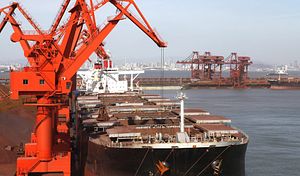As defense ministers and national leaders across the Asia-Pacific converged on Singapore to discuss the region’s pressing security issues at the annual Shangri-La Dialogue, a number of Australian government representatives, journalists and business leaders met here in Melbourne on May 30 to discuss the country’s growing political and business interests in China.
The Australia in China’s Century Conference, first held in Sydney last year and jointly organized by The Australian and The Wall Street Journal, offered a wide range of views on the Australia-China relationship and an important reflection on the unique challenges and opportunities facing policymakers and business leaders in Australia.
Julie Bishop, the Minister for Foreign Affairs, kicked things off on a realist note, warning in her keynote speech that “Australia must not fall into the trap of thinking that we are simply in the right place at the right time” to take advantage of China’s rapid economic growth. “Creative engagement,” she said would be necessary if Australia is to “broaden and deepen and diversify our relationship with China.” One such example trumpeted by the minister was the expansion of the New Colombo Plan, which encourages Australian students to study in Asia, to mainland China in 2015.
Ryan Stokes, Chief Operating Officer of Seven Group Holdings, highlighted the great opportunities opening up for Australian businesses in China as a growing middle class takes shape, identifying four key areas for trade: food, education, tourism and technology. While recognizing the difficulties Australian companies face getting a foothold in China, Stokes argued for Australia to more actively pursue export opportunities in these high-growth areas. Concluding the proposed Australia-China FTA, he added, would “go a long way to confirming our capacity to deliver on China’s needs.”
The view was shared by Jason Chang, managing director and CEO of EMR Capital, who believes Australia is in a “privileged position” due to its vast resources trade with China, but that Australian companies need to use this as a platform for seeking out opportunities in all areas of business, particularly services. Australian businesses still see China “as a long-term play which doesn’t provide short-term returns,” he said. “That’s possibly right, but it disincentivises corporate Australia from making big investments involving China.”
The difficulty could be that such investments require a much deeper understanding of Chinese language, and cultural and business practices than is currently the case. On this point, Warwick Smith, chairman of the Australia China Council, echoed Julie Bishop’s warning about complacency, pointing out that it’s “a very competitive global race to position strongly with North Asia, and China particularly.” To do so, he said Australia will “need to address this urgently through real partnerships between business, government, civil society and our educational and cultural institutions.”
Of course, a number of such proposals were raised in the Australia in the Asian Century white paper in 2012, such as quotas for business leaders and senior bureaucrats to become Asia-literate, though these appear to have lost some momentum with the change in government.
Andrew Forrest, chairman of Fortescue, an Australian iron ore company, criticized the lack of a whole-of-country approach to agricultural exports to China, which neighboring New Zealand has achieved with Fonterra, a dairy exporter. But the government did score some notable points with Prime Minister Tony Abbot’s recent trade mission to China in April, which included up to 600 business people, as part of a renewed effort to strengthen Australia’s trade relationship with China.
The challenge will be translating the seemingly resilient optimism expressed by nearly every speaker about China into concrete action. As Andrew Bassat, CEO of SEEK, an online employment firm, noted, “Australian companies are fairly risk averse at the moment” due to the perceived economic slowdown in China, but “there is no doubt the opportunities are being under exploited.”
On Australia in China’s century, the message from the conference was clear: more can always be done.

































